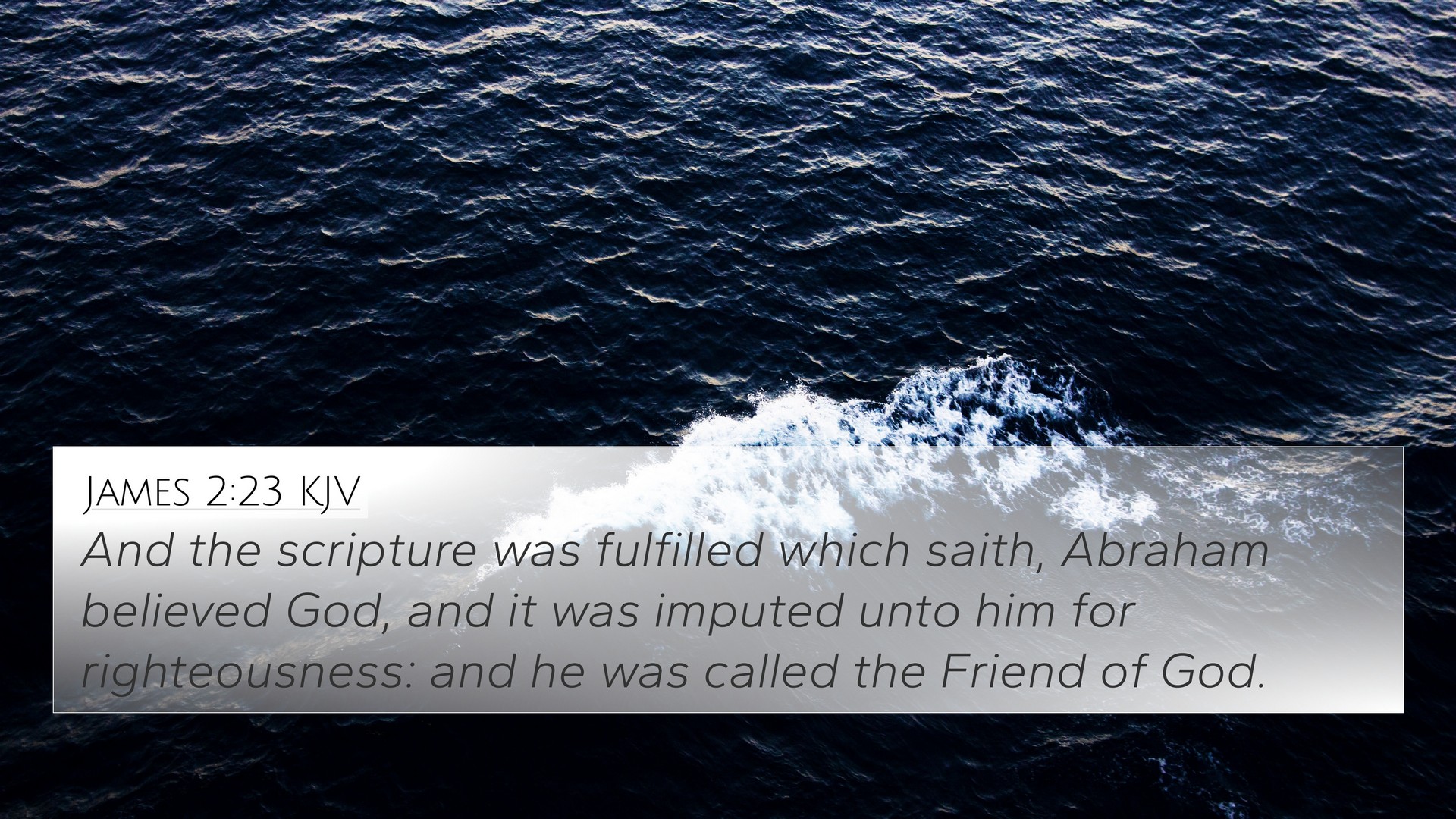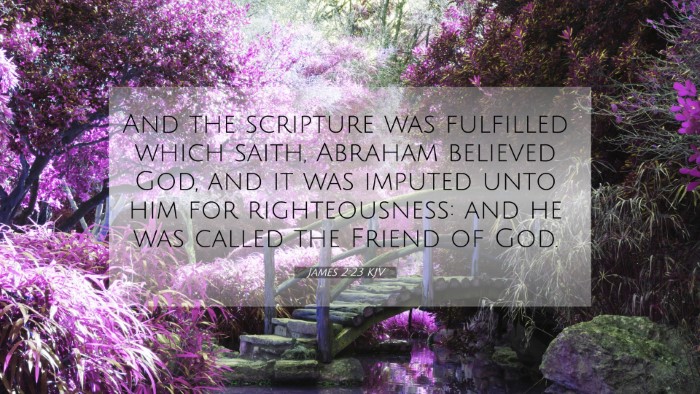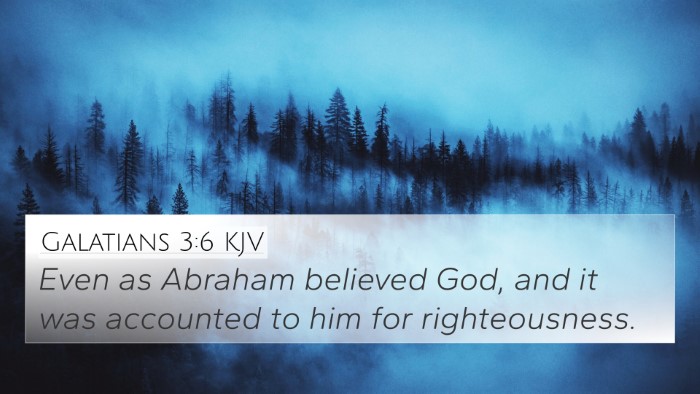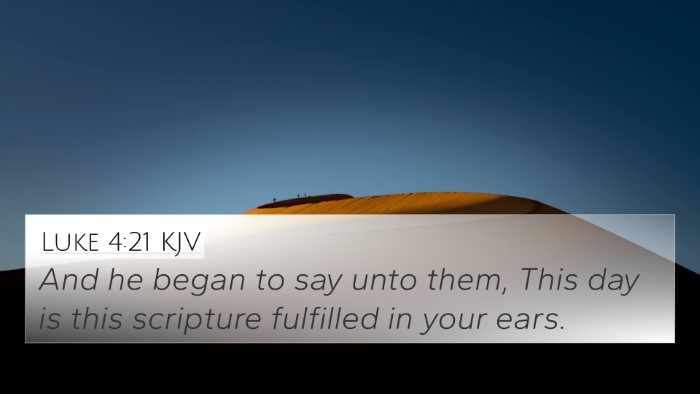Old Testament
Genesis Exodus Leviticus Numbers Deuteronomy Joshua Judges Ruth 1 Samuel 2 Samuel 1 Kings 2 Kings 1 Chronicles 2 Chronicles Ezra Nehemiah Esther Job Psalms Proverbs Ecclesiastes Song of Solomon Isaiah Jeremiah Lamentations Ezekiel Daniel Hosea Joel Amos Obadiah Jonah Micah Nahum Habakkuk Zephaniah Haggai Zechariah MalachiJames 2:23 Similar Verses
James 2:23 Cross References
And the scripture was fulfilled which saith, Abraham believed God, and it was imputed unto him for righteousness: and he was called the Friend of God.
Uncover the Rich Themes and Topics of This Bible Verse
Listed below are the Bible themes associated with James 2:23. We invite you to explore each theme to gain deeper insights into the Scriptures.
James 2:23 Cross Reference Verses
This section features a detailed cross-reference designed to enrich your understanding of the Scriptures. Below, you will find carefully selected verses that echo the themes and teachings related to James 2:23 KJV. Click on any image to explore detailed analyses of related Bible verses and uncover deeper theological insights.

Isaiah 41:8 (KJV) »
But thou, Israel, art my servant, Jacob whom I have chosen, the seed of Abraham my friend.

2 Chronicles 20:7 (KJV) »
Art not thou our God, who didst drive out the inhabitants of this land before thy people Israel, and gavest it to the seed of Abraham thy friend for ever?

Exodus 33:11 (KJV) »
And the LORD spake unto Moses face to face, as a man speaketh unto his friend. And he turned again into the camp: but his servant Joshua, the son of Nun, a young man, departed not out of the tabernacle.

John 15:13 (KJV) »
Greater love hath no man than this, that a man lay down his life for his friends.
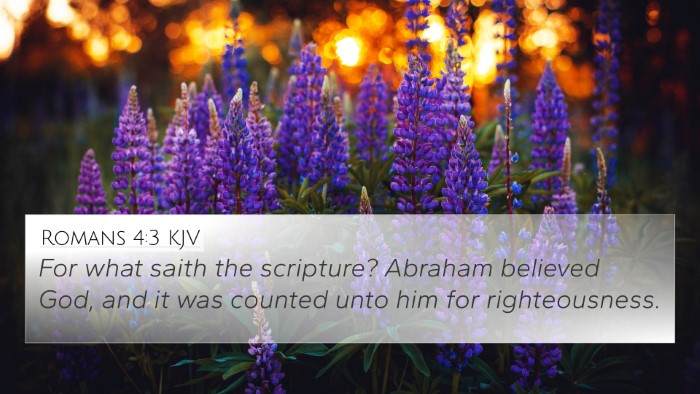
Romans 4:3 (KJV) »
For what saith the scripture? Abraham believed God, and it was counted unto him for righteousness.
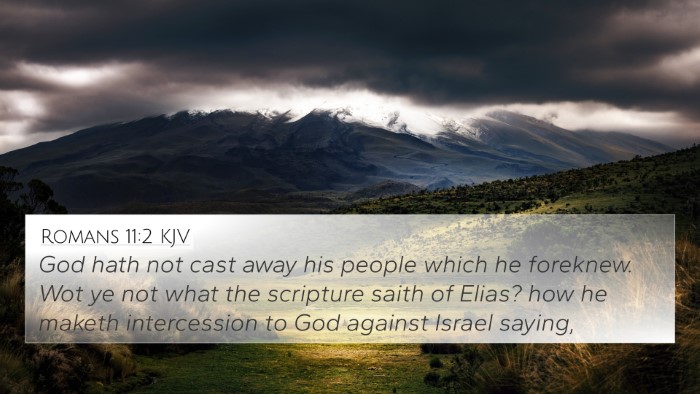
Romans 11:2 (KJV) »
God hath not cast away his people which he foreknew. Wot ye not what the scripture saith of Elias? how he maketh intercession to God against Israel saying,

Galatians 3:22 (KJV) »
But the scripture hath concluded all under sin, that the promise by faith of Jesus Christ might be given to them that believe.
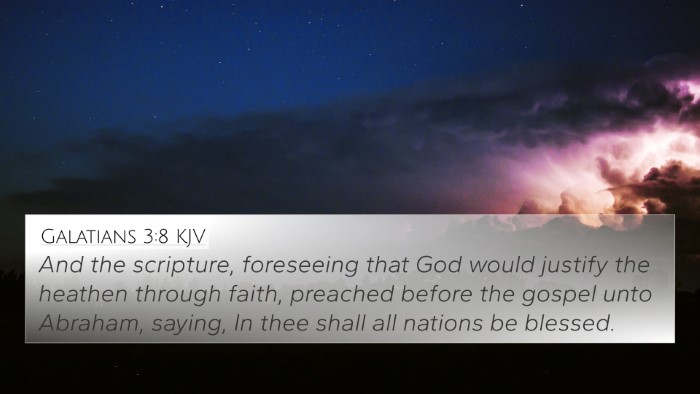
Galatians 3:8 (KJV) »
And the scripture, foreseeing that God would justify the heathen through faith, preached before the gospel unto Abraham, saying, In thee shall all nations be blessed.

Romans 9:17 (KJV) »
For the scripture saith unto Pharaoh, Even for this same purpose have I raised thee up, that I might shew my power in thee, and that my name might be declared throughout all the earth.
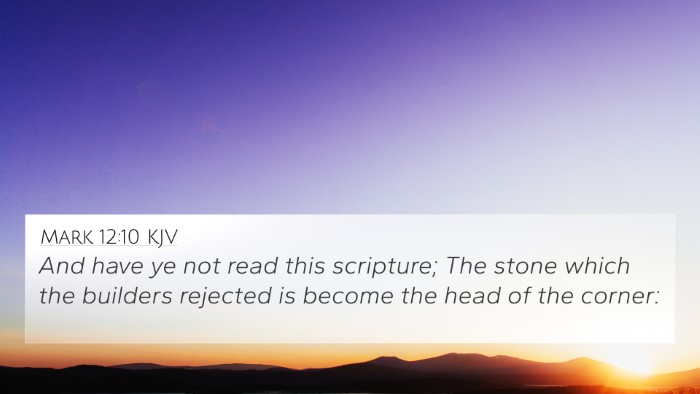
Mark 12:10 (KJV) »
And have ye not read this scripture; The stone which the builders rejected is become the head of the corner:

Romans 4:10 (KJV) »
How was it then reckoned? when he was in circumcision, or in uncircumcision? Not in circumcision, but in uncircumcision.
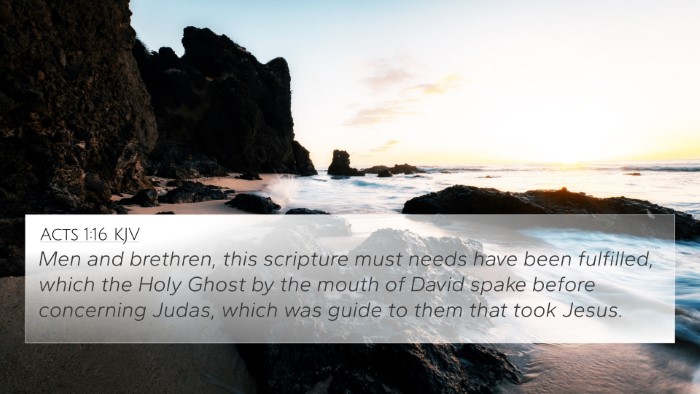
Acts 1:16 (KJV) »
Men and brethren, this scripture must needs have been fulfilled, which the Holy Ghost by the mouth of David spake before concerning Judas, which was guide to them that took Jesus.

Mark 15:27 (KJV) »
And with him they crucify two thieves; the one on his right hand, and the other on his left.
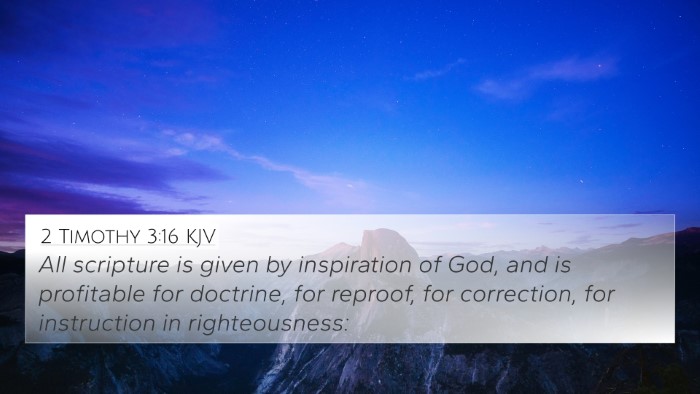
2 Timothy 3:16 (KJV) »
All scripture is given by inspiration of God, and is profitable for doctrine, for reproof, for correction, for instruction in righteousness:
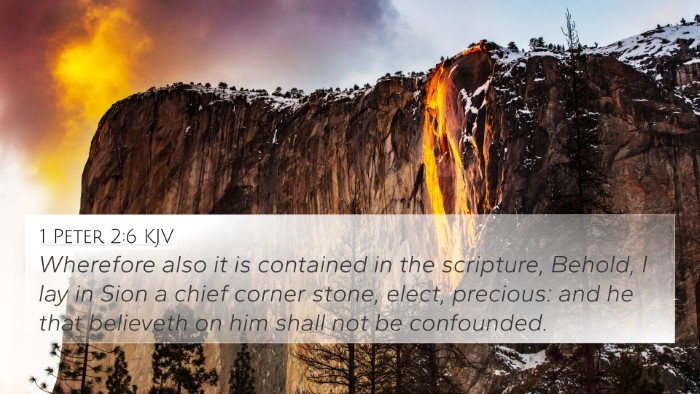
1 Peter 2:6 (KJV) »
Wherefore also it is contained in the scripture, Behold, I lay in Sion a chief corner stone, elect, precious: and he that believeth on him shall not be confounded.
James 2:23 Verse Analysis and Similar Verses
Understanding James 2:23
Bible Verse: James 2:23 - "And the scripture was fulfilled which saith, Abraham believed God, and it was imputed unto him for righteousness: and he was called the Friend of God." (KJV)
Overview of Key Themes
- Faith and Righteousness: The theme of faith as the basis for righteousness is critical in the context of Abraham's belief.
- Divine Friendship: Being called the "Friend of God" highlights a special relationship between God and those who believe.
- Scriptural Fulfillment: The verse emphasizes that scripture is fulfilled through the actions and faith of the faithful, connecting Old Testament promises with New Testament teachings.
Commentary Insights
The following are insights drawn from public domain commentaries by Matthew Henry, Albert Barnes, and Adam Clarke:
Matthew Henry's Commentary
Matthew Henry emphasizes the significance of Abraham's faith and how it was credited to him as righteousness. He notes that faith is the channel for receiving God's blessings, and this belief was both personal and active, showcasing Abraham's trust in God's promises. This highlights that true faith is not merely intellectual assent but involves a profound commitment to God’s will.
Albert Barnes' Notes
Albert Barnes elaborates on the definition of faith, pointing out that belief in God’s word leads to justification. He indicates that James quotes the Old Testament to prove that justification by faith precedes and enables the actions that stem from that faith. Barnes provides a profound connection between Abraham’s faith and the believer's faith today, reinforcing the idea that faith leads to divine acceptance.
Adam Clarke's Commentary
Adam Clarke focuses on the relationship that faith establishes. He underscores that being called a "Friend of God" signifies an intimate relationship resulting from faithfulness and obedience. Clarke draws from theological reflections, linking this verse to the greater narrative of God’s promises and the historical unfolding of His salvation plan.
Cross-Referencing Biblical Texts
This verse is intricately connected to several other scriptural texts, enhancing its meaning through the lens of cross-references:
- Genesis 15:6: "And he believed in the LORD; and he counted it to him for righteousness."
- Romans 4:3: "For what saith the scripture? Abraham believed God, and it was counted unto him for righteousness."
- Galatians 3:6: "Even as Abraham believed God, and it was accounted to him for righteousness."
- Isaiah 41:8: "But thou, Israel, art my servant, Jacob whom I have chosen, the seed of Abraham my friend."
- John 15:13-15: "Greater love hath no man than this, that a man lay down his life for his friends. Ye are my friends, if ye do whatever I command you."
- Hebrews 11:8: "By faith Abraham, when he was called to go out into a place which he should after receive for an inheritance, obeyed; and he went out, not knowing whither he went."
- James 2:21: "Was not Abraham our father justified by works, when he had offered Isaac his son upon the altar?"
Thematic Connections
When performing a comparative Bible verse analysis, the connections between various verses applied together provide a deeper understanding of faith’s role in righteousness:
- Abraham as a Model of Faith: Through cross-referencing Genesis and Romans, Abraham is seen not only as the father of Israel but as a prototype for all who believe.
- Faith and Works: The juxtaposition of James’ epistle with Pauline letters highlights the relationship between faith (belief) and works (action).
- Friendship with God: Exploring references to divine friendship throughout scripture illustrates how faith creates a relational bond with God.
Applying Cross-Referencing Tools
Understanding James 2:23 can be enriched using tools for Bible cross-referencing:
- Utilize a Bible concordance to find synaptic relationships between terms and themes.
- Employ a cross-reference Bible study for thorough exploration of associated texts.
- Delve into a Bible cross-reference guide for systematic studies.
- Examine cross-reference Bible study methods to discern how different scriptures engage with each other.
User Intent and Exploration
For those searching for ways to deepen their understanding of James 2:23, consider the following:
- What verses are related to Abraham's faith and righteousness?
- How do the teachings in James relate to those in Romans or Galatians?
- Find cross-references for understanding the implications of being called a "Friend of God".
Conclusion
James 2:23 serves as a vital junction in the discussion of faith, righteousness, and the character of God’s relationship with humanity. Engaging with this verse through comparative study and thoughtful cross-referencing with the Old and New Testament encourages deeper contemplation on the nature of belief and divine friendship. Faith as articulated in scripture not only fulfills Old Testament prophecies but also establishes a transformative relationship with God that resonates through time.
